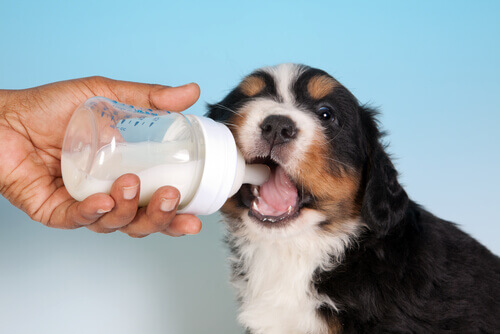What Is Canine Mastitis?

Like in the case of humans, there are many common diseases that dogs can suffer from. Canine mastitis is one of them and we’ll tell you about it in this article.
What is mastitis?
Mastitis is a very painful inflammation and infection of the teats. It’s usually caused by a loss of the quality of the milk, which not only affects the mother, but can also lead to the death of the puppies, due to not being properly nourished.
Even though mastitis has always been a recognized disease in humans, it’s been known for several years that dogs and other mammals can also suffer from it. Identifying the symptoms and knowing how to act is essential in order to help your dog and save the lives of its puppies.
Female dogs can get mastitis, how do you identify it?
Mastitis can occur even in dogs that are psychologically pregnant. In fact, it’s one of the most common symptoms of this type of “pregnancy”.

Canine mastitis doesn’t always present an infection, because it can simply be an inflammation. However, in any of these cases, it’ll always cause great pain and discomfort to your pet.
One of the causes is the pressure that puppies make on their mother’s teats with their paws and nails. This behavior can cause injuries, which together with the new mother’s low defenses, favors the development of the infection.
Symptoms of canine mastitis
As we always say, paying attention to any change in our pet is part of the responsibility we take on when adopting it. Therefore, check if your dog shows any, or several, of these symptoms in order to act promptly:
- Apathy
- Fatigue
- Lethargy
- Sensitivity to touch in the area
- Increased heart rate
- Vomiting
- Diarrhea
- Fever
- Redness and irritation of the breasts
- Loss of appetite
- Breast hardness
Remember that mastitis also affects puppies and this may show signs that the milk they’re drinking isn’t of good quality. These signs can include weight loss, not eating enough, weakness, whining, and skin or digestive problems.
If you see any of these signs, either in the mother or in the puppies, go to the vet to remedy the problem as soon as possible. In fact, if the milk isn’t good, the puppies won’t want to suck, so it’ll accumulate in the mother’s breasts, which could have fatal consequences.
Your vet will most likely suggest that you feed your puppies with puppy formula from a bottle until they’re able to eat more solid food.

Diagnosis of canine mastitis
Besides taking into account the above mentioned symptoms, your vet will examine your dog and may even do an ultrasound or similar test, depending on the condition of the mastitis and the state of the animal.
A microbiological culture of the milk and even a cytology may also be required. When the vet determines that it’s mastitis and its degree of severity, then the treatment will begin.
Treatment
Don’t treat your dog on your own, nor on the recommendation of others. Only your vet can determine the correct treatment for your pet. The first thing you should do is extract the mother’s milk that accumulated in the breasts in order to relieve the animal. There may be abscesses or tumors and surgery may be necessary.
The treatment with antibiotics, in order to relieve pain and eliminate the infection, if any, will last between two and three weeks. The most common medications for treating canine mastitis are amoxicillin and clavulanic acid, cephalexin or cefoxitin.
Follow any instructions your vet gives you. As soon as you suspect that your dog may have mastitis, don’t allow it to continue to breastfeed, as this is harmful to both the puppies and the mother.
Don’t worry, if you notice these changes in your pet and act in time, mastitis has a simple solution.
Like in the case of humans, there are many common diseases that dogs can suffer from. Canine mastitis is one of them and we’ll tell you about it in this article.
What is mastitis?
Mastitis is a very painful inflammation and infection of the teats. It’s usually caused by a loss of the quality of the milk, which not only affects the mother, but can also lead to the death of the puppies, due to not being properly nourished.
Even though mastitis has always been a recognized disease in humans, it’s been known for several years that dogs and other mammals can also suffer from it. Identifying the symptoms and knowing how to act is essential in order to help your dog and save the lives of its puppies.
Female dogs can get mastitis, how do you identify it?
Mastitis can occur even in dogs that are psychologically pregnant. In fact, it’s one of the most common symptoms of this type of “pregnancy”.

Canine mastitis doesn’t always present an infection, because it can simply be an inflammation. However, in any of these cases, it’ll always cause great pain and discomfort to your pet.
One of the causes is the pressure that puppies make on their mother’s teats with their paws and nails. This behavior can cause injuries, which together with the new mother’s low defenses, favors the development of the infection.
Symptoms of canine mastitis
As we always say, paying attention to any change in our pet is part of the responsibility we take on when adopting it. Therefore, check if your dog shows any, or several, of these symptoms in order to act promptly:
- Apathy
- Fatigue
- Lethargy
- Sensitivity to touch in the area
- Increased heart rate
- Vomiting
- Diarrhea
- Fever
- Redness and irritation of the breasts
- Loss of appetite
- Breast hardness
Remember that mastitis also affects puppies and this may show signs that the milk they’re drinking isn’t of good quality. These signs can include weight loss, not eating enough, weakness, whining, and skin or digestive problems.
If you see any of these signs, either in the mother or in the puppies, go to the vet to remedy the problem as soon as possible. In fact, if the milk isn’t good, the puppies won’t want to suck, so it’ll accumulate in the mother’s breasts, which could have fatal consequences.
Your vet will most likely suggest that you feed your puppies with puppy formula from a bottle until they’re able to eat more solid food.

Diagnosis of canine mastitis
Besides taking into account the above mentioned symptoms, your vet will examine your dog and may even do an ultrasound or similar test, depending on the condition of the mastitis and the state of the animal.
A microbiological culture of the milk and even a cytology may also be required. When the vet determines that it’s mastitis and its degree of severity, then the treatment will begin.
Treatment
Don’t treat your dog on your own, nor on the recommendation of others. Only your vet can determine the correct treatment for your pet. The first thing you should do is extract the mother’s milk that accumulated in the breasts in order to relieve the animal. There may be abscesses or tumors and surgery may be necessary.
The treatment with antibiotics, in order to relieve pain and eliminate the infection, if any, will last between two and three weeks. The most common medications for treating canine mastitis are amoxicillin and clavulanic acid, cephalexin or cefoxitin.
Follow any instructions your vet gives you. As soon as you suspect that your dog may have mastitis, don’t allow it to continue to breastfeed, as this is harmful to both the puppies and the mother.
Don’t worry, if you notice these changes in your pet and act in time, mastitis has a simple solution.
This text is provided for informational purposes only and does not replace consultation with a professional. If in doubt, consult your specialist.








